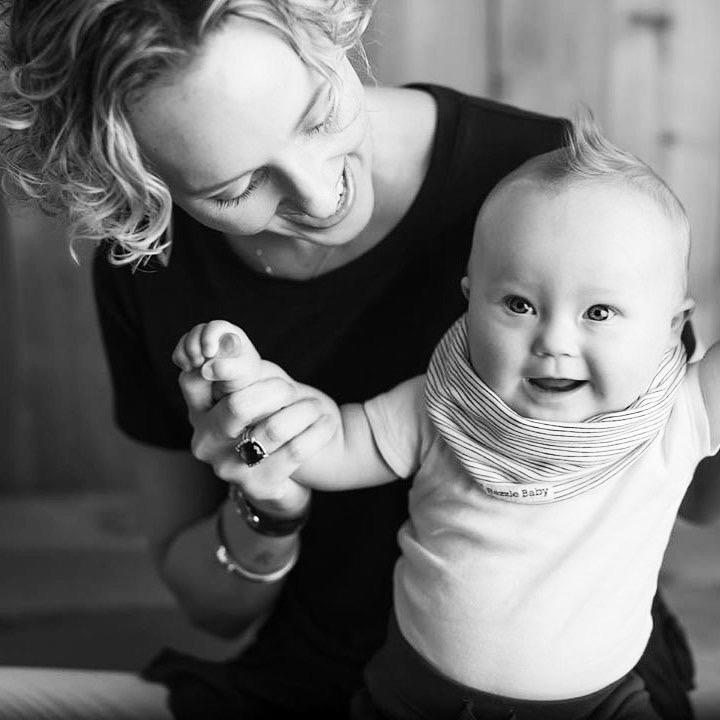Congratulations!

Congratulations on the recent or upcoming birth of your baby and welcome to the Down syndrome community! Although there will be challenges, an exciting journey lies ahead, and NDSS is here to provide information and support along the way. Click the links below to learn more.
Click here for a map to find your local Buddy Walk - a fantastic awareness event for Down syndrome and a great way to meet local families!
Click here for a local affiliate map to find your closest Down syndrome affiliate.
Celebrate a baby with Down syndrome with a complimentary gift from Jack’s Basket!
A Promising Future Together: A Guide for New and Expectant Parents
Download: A Promising Future Together
Descargar: Un Futuro Prometedor Juntos
National Resources
Prenatal Diagnosis
The National Down Syndrome Society (NDSS) advocates for increased FDA oversight of noninvasive prenatal screening tests (NIPTs) for Trisomy 21 and supports legislation and advocacy at all levels for effective solutions toward that goal. NDSS advocates that up-to-date and accurate information on Down syndrome be delivered to women and families at the time of diagnosis. Additionally, we work with partner organizations involved in pregnancy, birth, and prenatal testing to provide accurate information that will support and encourage parents, healthcare workers, and family members to welcome children with Down syndrome into their lives.
NDSS, Global Down Syndrome Foundation, and National Down Syndrome Congress have collaborated to co-publish an important resource for expectant and new parents.
Access the Spanish version here.
There are two types of tests for Down syndrome that can be performed before your baby is born: screening tests and diagnostic tests.
Prenatal Screenings
Prenatal screenings estimate the chance of the fetus having Down syndrome. These tests do not tell you for sure whether your fetus has Down syndrome; they only provide a probability. Diagnostic tests, on the other hand, can provide a definitive diagnosis with almost 100% accuracy.
There is an extensive menu of prenatal screening tests now available for pregnant women. Most of these screening tests involve a blood test and an ultrasound (sonogram). The blood tests (or serum screening tests) measure quantities of various substances in the blood of the mother, including alpha-fetoprotein, inhibin A, plasma protein A, estriol, and human chorionic gonadotropin. Together with a woman’s age, these are used to estimate her chance of having a child with Down syndrome. Typically offered in the first and second trimesters, maternal serum screening tests are only able to predict about 80% of fetuses with Down syndrome. It is important to note that none of these prenatal screens will be able to definitively diagnose Down syndrome. Instead, mothers should expect results such as, “You have a 1 in 240 chance of having a child with Down syndrome” or “You have a 1 in 872 chance of having a child with Down syndrome.”
These blood tests are often performed in conjunction with a detailed sonogram (ultrasound) to check for physical features that are associated with Down syndrome in the fetus. Recently, researchers have developed a maternal serum/ultrasound/age combination that can yield a much higher accuracy rate at an earlier stage in the pregnancy. Even with the ultrasound, however, the screen will not definitively diagnose Down syndrome.
In recent years, noninvasive prenatal screening tests have been made available. These tests involve blood being taken from the expectant mother as early as 10 weeks of gestation. It relies on the detection of cell-free DNA that circulates between the fetus and the expectant mother. According to the latest research, this blood test can detect up to 98.6% of fetuses with trisomy 21. The chance of having a child with Down syndrome with a “positive” result varies widely depending on maternal age and gestational age. We recommend you speak with your physician or genetic counselor to understand your risk. The turnaround time for the test is about 8-10 days, and approximately 0.8% of the time, results are not obtained from the tests due to technical standards. While the initial clinical trials were conducted just on cases with trisomy 21, one form of Down syndrome, a “positive” result cannot distinguish between trisomy 21, translocation Down syndrome and high-percentage mosaic Down syndrome. Put another way, a “positive” result will pick up all forms of Down syndrome, except mosaic Down syndrome that is 33% or lower. All mothers who receive a “positive” result on this test are encouraged to confirm the diagnosis with one of the diagnostic procedures described below.
Prenatal screening tests are now routinely offered to women of all ages. If the chance of having a child with Down syndrome appears high during prenatal screening, doctors will often advise a mother to undergo diagnostic testing.
Diagnostic Procedures
The diagnostic procedures available for prenatal diagnosis of Down syndrome are chorionic villus sampling (CVS) and amniocentesis. These procedures, which carry up to a 1% risk of causing a spontaneous termination (miscarriage), are nearly 100% accurate in diagnosing Down syndrome. Amniocentesis is usually performed in the second trimester between 15 and 22 weeks of gestation, CVS in the first trimester between 9 and 14 weeks. Amniocentesis and CVS are also able to distinguish between these genetic types of Down syndrome: trisomy 21, translocation Down syndrome, and mosaic Down syndrome.
Choosing To Test Or Not
Whether or not to undergo a prenatal screening or diagnostic test is a personal decision, and expectant parents must make the choice that is best for them. Some parents would like to know as soon as possible if their fetus has Down syndrome so that they can make preparations (like informing other family members and doing research on Down syndrome) prior to the birth. Families who have chosen this option have reported in research studies that the birth of their child with Down syndrome is as much of a celebratory process as any other birth because they have had time to adjust to the new diagnosis.
One of the best ways to learn more is to speak to family members of individuals with Down syndrome through a local Down syndrome organization. In addition, there are many books and articles written by family members about their personal experiences. A message from families that is echoed again and again is that the positive impacts of having a member with Down syndrome far outweigh any difficulties or challenges that may come up.
If you have any questions about these procedures, do not hesitate to ask your doctor. It is important that you receive accurate information and understand all your options.
Postnatal Diagnosis
Since many expectant parents choose to forgo prenatal tests, most cases of Down syndrome are diagnosed after the baby is born. Doctors will usually suspect Down syndrome if certain physical characteristics are present.
Some Of The Traits Common To Babies With Down Syndrome Include
- Low muscle tone
- A flat facial profile
- A small nose
- An upward slant to the eyes
- A single deep crease across the center of the palm
- An excessive ability to extend the joints
- Small skin folds on the inner corner of the eyes
- Excessive space between large and second toe
Not all babies with Down syndrome have all these characteristics, and many of these features can be found, to some extent, in individuals who do not have the condition. Therefore, doctors must perform a special test called a karyotype before making a definitive diagnosis. To obtain a karyotype, doctors draw a blood sample to examine your baby’s cells. They photograph the chromosomes and then group them by size, number, and shape. By examining the karyotype, they can determine accurately whether or not your baby has Down syndrome.
Finding Support
Is What I’m Feeling Normal?
Learning that your baby has Down syndrome is not an easy thing for anyone to face, and right now you may be experiencing a roller coaster of emotions. While everyone handles the diagnosis in their own way, certain reactions are common in new or expectant parents of a child with a disability.
For the majority of parents, the period immediately following the diagnosis is filled with uncertainty and doubt. For example, you might worry about how the condition will impact your child’s life and whether or not you are equipped to handle all the responsibilities of raising a child with a disability. If your child has health complications, you may have additional fears and concerns. It is natural to experience denial, anger, depression, and other stages of grief as you adjust to the news that your baby has Down syndrome. Even for parents who knew they were at a higher risk of having a child with Down syndrome or have received a positive diagnosis, acceptance can be difficult or, at first, seem impossible.
Know that whatever you may be feeling is normal. More importantly, know that you are not alone. There are many sources of support available to new parents of children with Down syndrome. In time and with the right support, you can expect the intensity of painful emotions to subside, and new, positive feelings to take their place. One of the best places to turn to for encouragement and reassurance is other parents of children with Down syndrome. Often, other parents can help you look beyond your baby’s diagnosis and delight in the joys of parenthood. They have been through what you are going through, and can be an invaluable source of support.
How Can I Get In Touch with Other Parents of Children with Down Syndrome?
One of the best ways to meet other parents is to get involved in a local Down syndrome parent support group. These groups can provide you with an excellent forum for sharing your feelings and concerns as a new parent, and an opportunity to learn from the experiences of others who have been in your shoes. Learning more about Down syndrome can also help ease some of your uncertainty, and support groups are a great place to start gaining knowledge. In addition to providing emotional support, other parents can recommend useful Down syndrome resources and help you understand the new terminology.
NDSS has a network of more than 375 affiliates. In addition to having support group meetings, most affiliates offer a wide range of programs and services for individuals with Down syndrome and their families, such as sibling workshops, expert-speaker presentations, early intervention programs, social activities and events to raise public awareness. Support group membership can provide benefits to you and your family now and in the future, so we encourage you to contact your local group and explore this option.
If there is no Down syndrome-specific support group in your area, your hospital or pediatrician may be able to provide contact information for other parents who have agreed to serve as a resource. There may also be a general support group for parents of children with disabilities that you can join. Alternately, you may consider starting your own support group to network with others. NDSS can provide you with information on how to get started.
What Are Some Other Things I Can Do to Take Care of Myself?
Right now, you are very focused on taking good care of your baby. But remember that it’s also important to take good care of yourself at this time. Doing so will keep you feeling healthy, strong and well-equipped to deal with your responsibilities as a new parent. It can also help you develop and maintain a positive frame of mind, which is necessary for meeting new challenges successfully. Here are some tips many new parents have found helpful for reducing anxiety and stress:
BE PATIENT WITH YOURSELF
The road to acceptance is a process, so give yourself time to deal with your emotional responses. Some days you might feel like you’re taking steps backward, but recognize that this doesn’t mean you aren’t making progress. If you feel it would be helpful, do not hesitate to contact a therapist. A therapist can help you find ways to cope and develop confidence in your ability to handle challenges.
BUILD A SUPPORT SYSTEM
It may be tempting to keep to yourself at this time, but doing so can result in feelings of isolation. Reach out to trusted friends or family members. This allows your loved ones to understand what you’re going through and gives them a chance to offer comfort and support. You can always let them know how much help you need or desire, and if you want time alone, don’t hesitate to say so.
Schedule some alone time regularly, and use this time to “recharge.” Read a book, take a warm bath, go for a walk, or just watch your favorite T.V. show. Do something you enjoy and find relaxing, and let yourself enjoy it. Alone time may sound like a luxury, but it is necessary for good health and can do wonders for your productivity and mood.
TAKE CARE OF YOUR PHYSICAL HEALTH
Research shows that a healthy eating and exercise plan can reduce fatigue, irritability, and risk for certain diseases and health complications. Develop a plan that works for you and make an effort to stick to it, especially during times of high stress. Be sure to get regular medical check-ups, too.
PRACTICE “LIVING IN THE MOMENT”
While it is important to plan ahead, worrying about the future can easily lead to anxiety. Although it may be hard, try to focus only on what you can do realistically in the present. If you find yourself getting anxious about a particular situation, try this strategy:
- Identify the problem
- Research your options
- Make a decision
- Set a date in the future to evaluate how your decision is working
In the meantime, just go with the decision you made and trust that it will work out.
DON’T LOSE SIGHT OF “THE IMPORTANT THINGS IN LIFE”
Nurture your relationships with your partner, children, friends, and family. Communicate with each other, laugh, do fun things together, celebrate traditions, and be sure to spend quality time with your new baby that doesn’t focus on his or her disability. The fact that your baby has Down syndrome is life-changing. But it doesn’t change the things that are truly important in life!








